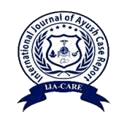Effect of Unani Formulations in the Management of Salaat E Rahem (Uterine Fibroid) - A Case Report
Abstract
Salaat e rahem (Uterine fibroid) lesions were initially known as the “uterine stone.” The term fibroid was first introduced in the 1860s. Uterine fibroids are prevalent pelvic tumours in women of reproductive age, affecting 20-50% of them based on age, ethnicity, parity, and assessment methods. They can occur as single or multiple focal fibroids or can be diffuse. After menopause, fibroids tend to contract. Surgery can be used to treat fibroid for urgent medical needs, but finding a medication without side effects remains challenging. In this case report, a 30-year-old patient presented with complaints of lower abdominal pain and irregular menstrual cycle. The USG confirmed presence of two solid masses in endometrium and multiple Nabothian cysts. Unani treatment was prescribed to her for three months. On follow ups her symptoms started to resolve. after three months USG was repeated which showed a normal scan with few Nabothian cysts. Through this article it can be concluded that uterine fibroids can be successfully treated with herbal preparations from Unani system of medicine.

This work is licensed under a Creative Commons Attribution-NonCommercial-NoDerivatives 4.0 International License.

